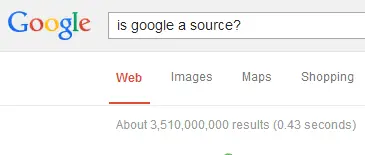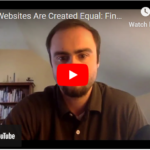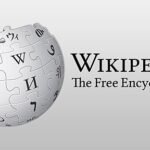 In my work as an academic librarian, one thing I frequently teach is how to identify a trustworthy source.
In my work as an academic librarian, one thing I frequently teach is how to identify a trustworthy source.
For research purposes, Google and Wikipedia have their limitations but they are almost always the first step for students. Because of this, one strategy is to take aggressive steps to prevent students from using them.
I recently came across this sentence in a departmental document, which I’d call a popular viewpoint:
Most professors consider Wikipedia and Google to be lacking as credible sources.
Taking the next logical step, it’s common to see an outright ban on sites like Wikipedia, Google or worse, the ever-nebulous and misleading “electronic” or “internet sources.” (Are library databases not electronic? Don’t I need the internet to read that e-book in my browser?)
The Problem with Banning Wikipedia
The point of these bans is that these rules will force students to use higher-quality library resources, but the approach can have some serious consequences.
As one librarian put it, students often have no idea why they are forbidden from using Wikipedia, and their most common answer, “because my professors said so,” is “the very antithesis of critical thinking,” which is what we’re supposed to be fostering with these research assignments in the first place.
And as I’ve written here before, Wikipedia usually is more trustworthy than it gets credit for, especially when used as a background research tool to get you started exploring a topic.
But I do agree that it’s a good idea to ban Wikipedia as an actual source in a research paper. It’s an open online encyclopedia where entries don’t have a named author and can be changed instantly. A tertiary source when a research paper should be supported by secondary and primary sources such as books and journal articles.
But let’s proceed to Google, the second half of the earlier sentence.
Is Google a “Credible Source”? Or a Source at All?
It’s a much more puzzling notion that Google is lacking as a credible source and deserving of a ban.
What does it even mean that Google is lacking as a source? Are students citing Google itself? What they surely mean is that websites found through a Google search tend to be biased, inaccurate or of inappropriate form (such as a personal blog post). Perhaps it would be better phrased that Google is lacking as a means to find credible sources.
But even then, what if I want to use an open-access peer-reviewed journal that I happened to find through Google? Or a report put out by a reputable organization or government web site? Try to find something like that from a typical library homepage in a couple of clicks and let me know how that goes.
In general, it does take more work but by critically evaluating Google search results you can almost always find something credible for a given topic.
No, it won’t be nearly as much as you would get in a library database. Yes, there will be a lot of opinion masquerading as fact. And yes, Wikipedia will probably be one of the first results, which brings us back to the first half of the blacklist.
But the aforementioned open access journals will likely be in there too. Google Scholar is a great way to find academic literature. And if I can use news sources for a paper, I’d much prefer to search Google News and read them on the paper’s official site than in a difficult-to-use and often awkwardly-formatted library database. (I do realize that some papers are behind paywalls and the archives will not go back very far.)
Instead of blacklists, why don’t we make it a priority to teach students these critical evaluation skills–things like investigating the identity of the author and determining the level and purpose–rather than say that they can’t find anything appropriate with Google? Why don’t we talk more about site operator searches (“keyword site:nytimes.com” or “keyword site:.gov”) and other Google strategies?
In addition to being useful for students now, these are great lifelong skills for the days after graduation when database access is cut off.
These are interesting questions to ponder, but there’s one more point I’d like to make.
My first reaction to the notion that “Google is lacking as a credible source” was that Google itself isn’t a source. It’s a search engine that helps you find sources.
But it seems that this standard answer is becoming less and less accurate.
As it turns out Google is trying to be a source in more and more situations. The company’s mission these days is to answer questions for you rather than point you to a list of links. It has long performed things like mathematical calculations, but now Google is doing a lot more right below the search box: discographies and filmographies for an artist or actor; unit conversions; translations, word definitions and synonyms; even public data like city populations and unemployment rates.
In these cases it seems that Google is becoming a source in its own right, although it often relies on the work of other sites to provide these answers. (Google isn’t great at citing its own sources; they’re often hard to see. And how will you know where Google gets its information in emerging products like Voice Search?)
Whatever the answer, it’s clear that Google plans to do much, much more in this area.
Check out the Google Knowledge Graph for a glimpse into the future of search and why the “Google isn’t a source” answer might not be a true statement moving forward.




Leave a Reply